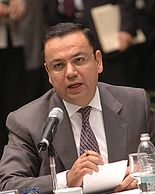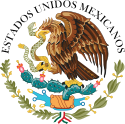- Mexican legislative election, 2009
-
Mexican legislative election, 2009 
2006 ← July 5, 2009 → 2012 All 500 seats to the Mexican Chamber of Deputies Majority party Minority party Third party 


Leader Beatriz Paredes Rangel Germán Martínez Alejandro Encinas Party PRI PAN PRD Leader since 2007 2007 July 2009 Leader's seat Jalisco Chiapas Federal District Last election 121 206 136 Seats won 241 147 72 Seat change  +135
+135 −59
−59 −54
−54Popular vote 12,591,855 9,549,798 4,164,393 Percentage 48.2% 29.4% 14.4% Swing  +24.0%
+24.0% −11.8%
−11.8% -10.8%
-10.8%Mexico 
This article is part of the series:
Politics and government of
MexicoExecutiveGeneral
Other countries · Atlas
Mexico Portal
Legislative elections were held in Mexico on 5 July 2009. Voters elected 500 new deputies (300 by their respective constituencies, 200 by proportional representation) to sit in the Chamber of Deputies for the 61st Congress.
Contents
Opinion Polling
Opinion polling, by pollster Demotecnia, that was taken less than a month before the election showed the Institutional Revolutionary Party with 36%, the National Action Party with 31%, and the Party of the Democratic Revolution with 16%.[1]
Voto en blanco
A none of the above movement, dubbed "voto en blanco", or "blank vote", had arisen in response to the perceived corruption of the three major parties running in this election. Starting as a small group on blogs and YouTube, the movement had expanded its ranks, with politicians and intellectuals, such as Jose Antonio Crespo, supporting the movement. Pollster Demotecnia showed that 3% of the people would be willing to boycott the elections in response to the "voto en blanco" movement.[1]
Opposition to the movement came from organizations such as the Federal Electoral Institute, a government institute who seeks to expand voter participation, who claimed that the response to an unsatisfactory democracy is not to have fewer people vote but to have more people involved in the electoral process.
Results
Summary of the 5 July 2009 Mexican Chamber of Deputies election results Party Votes % (of
all votes)Seats +/− % Institutional Revolutionary Party 12,591,855 36.68% 241 +135 48.2% National Action Party 9,549,798 27.98% 147 −59 29.4% Party of the Democratic Revolution 4,164,393 12.20% 72 −54 14.4% Ecologist Green Party of Mexico 2,291,298 6.71% 17 ±0 3.4% Labor Party 1,258,341 3.68% 9 −2 1.8% New Alliance Party 1,164,999 3.41% 8 −1 1.6% Convergence 850,777 2.49% 6 −12 1.2% Social Democratic Party 353,261 1.03% 0 −5 — Independents 62,101 0.18% 0 −2 — Valid votes 32,286,823 94.61% 500 — 100.0% Invalid votes 1,839,971 5.39% Total votes (turnout: %) 34,126,794 100.0% Sources: El Universal, IFE PREP 2009 References
Presidential elections Parliamentary elections 1824 · 1828 · 1833 · 1837 · 1842 · 1848 · 1850 · 1853 · 1857 · 1861 · 1867 · 1871 · 1872 · 1876 · 1877 · 1880 · 1884 · 1888 · 1892 · 1896 · 1900 · 1904 · 1910 · 1912 · 1917 · 1920 · 1924 · 1928 · 1929 · 1934 · 1940 · 1943 · 1946 · 1949 · 1952 · 1955 · 1958 · 1961 · 1964 · 1967 · 1970 · 1973 · 1976 · 1979 · 1982 · 1985 · 1988 · 1991 · 1994 · 1997 · 2000 · 2003 · 2006 · 2009 · 2012
This North American election-related article is a stub. You can help Wikipedia by expanding it.
